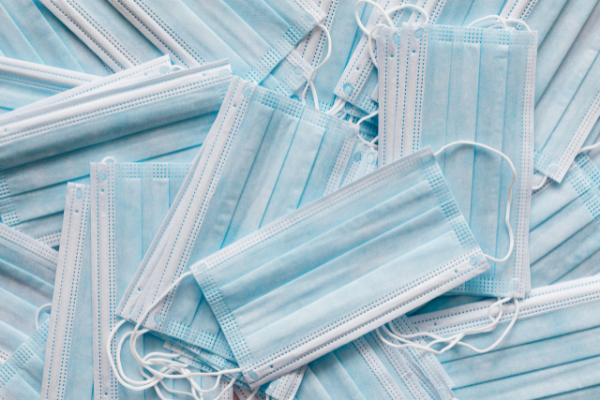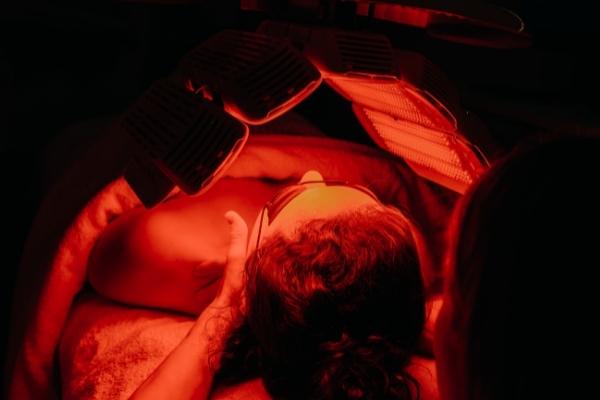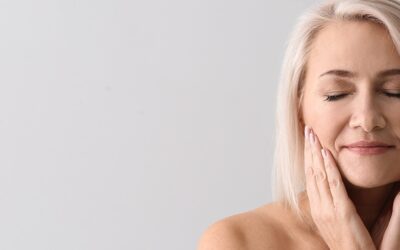Wearing a face mask is essential in the age of Covid-19 – but it’s often not too kind to your skin. To help navigate our new normal, and keep your skin looking its best, we asked our skin experts Bryony and Bhavna for their top tips.
- Mask-related skin issues
- Masks & oily skin
- Masks & dry/sensitive skin
- Altering your skincare
- Skincare for acne-prone
- Skincare for dry/sensitive
- Prevention of maskne
- In-clinic treatments
- Frequency of treatments
- Best types of masks
- Mask hygiene
What mask-related skin conditions have you been observing in your clients?
Bryony Nixon – I’ve seen increased congestion, acne and inflammation. However for our seasoned clients, not a lot as their skin is in good condition usually so they are usually doing things to counter some of the negative side-effects of masks.
Bhavna Maharaj – There has been irritation, redness, and the odd spot on the chin or jawline. With younger clients, a lot more sebaceous activity, whiteheads and congestion.
How can masks affect oily or acne-prone skin?
BN If someone is oily/acne-prone they are more likely to be prone to ‘maskne’ as are people with a history of perioral dermatitis. The mask is likely to aggravate skin conditions already present. If someone is acne-prone and they are not wearing a fresh mask or wearing it for long period, it’s the perfect breeding ground for bacteria to spread.
Can masks also affect dry or sensitive skin?
BN A dry skin could lead to flaking but not always as people are generally lipid dry or oily – one or the other. If you are flaking, it’s likely your skin is ‘sensitised’. This is a skin condition, rather than a true ‘sensitive’ (which is a skin type that doesn’t change). It’s caused by incorrect product use, accumulation of environmental stressors, photo damage. Sensitised skin/impaired can be repaired. If you have low lipids (a true dry skin) then you are generally more reactive.
BM Dry skin doesn’t necessarily mean sensitive skin or vice versa. If you are on prescribed skincare, you should be able to manage dry skin and sensitivity a lot better. Sensitivities can occur due to barrier impairments and the skin’s microbiome being out of balance. Also look at your diet, foods you are consuming and supplements you could take to support a healthier and more balanced skin such as fish oils or other forms of essential fatty acids.
Do people need to alter their skincare routine if they’re wearing a mask?
BN They shouldn’t necessarily be changing everything, but they can add in products if appropriate to their current skin condition.
BM If you have a skin therapist you go to regularly, you should seek advice as to what changes you could make to your current routine at home and in the clinic to help combat the new skin issues that may be creeping up for you due to mask use. It could be something as simple as washing your masks daily, changing your pillow covers. Or adding in a product that may have more antibacterial and exfoliating benefits. It may be a temporary change as your skin keeps evolving.
What skincare you recommend for acne-prone skin?
BN Vitamin A, sometimes AHAs and BHAs, antioxidants, vitamin C (in some cases, a different form compared with a lipid dry skin). And always SPF.
BM A good cleanser with AHAs and BHAs. Niacinamide, retinol and lots of antioxidants. A good diet and supplements such as zinc, magnesium and fish oils can’t go amiss either. Look into treatments such as peels to help support your homecare and get more results.
What skincare you recommend for dry or sensitised skin?
BN Vitamin A, sometimes AHAs, antioxidants, vitamin C (if sensitised sometimes none, or a different form for a lipid dry skin). More emollients, humectants, plus SPF.
BM Avoid too many oils on your face and products with fragrances. Always cleanse morning and night with an appropriate cleanser to remove makeup, pollutants and bacteria from your skin. A course of LED light can work wonders for sensitive skins.
Is there anything you can do preventatively to stop mask-related skin conditions?
BN Practice good mask hygiene. If possible, choose a mask that is breathable and doesn’t rub on the skin and as much mask-free time as possible. If you are going to be working in a heavily air-conditioned place of work with a tight-fitting mask and have more lipid dry skin that is more likely to get irritated, then possibly some extra nourishment with skincare masks antioxidants to help lower any inflammation. That is also great for age-maintenance too.
What in-clinic treatments can help with maskne?
BN Everything! Healite lowers inflammation. Vitamin A peels repair damage, speed up cell turnover, and can be paired with layered peels which can be done in specific areas if needed.
BM A course of Healites will be great for anyone. But also an option for people who aren’t on active skincare or don’t have a current skin care regime at home or in salon. It is great for sensitised and reactive skins as well since you can’t have an allergic reaction to LED lights.
For regular clients, Vitamin A peels with your appointments, layered peeling or spot treatment with salicylic peels will help combat b/outs. But keep in mind that being consistent with treatments and products is fundamental to keeping on top of skin conditions for everyone. Treatments help with Increased skin cell turnover, healing of breakouts and cystic acne, reduction in redness and irritation – and overall improvement in skin immunity and skin health.
Do you need to have a lot of treatments to stay on top of maskne?
BN Homecare and mask hygiene is most important. If they were suffering from acne, peels can be brought closer together than 4 weeks, which is what most clients do – every 2-3 weeks for some peels. If it’s more an issue of dermatitis, then often they might have course of Healite and peels every 4 weeks, but it would always depend if they are appropriate.
BM You don’t need to book everything under the sun. Take guidance from your skin professional for your specific condition. Again, as mentioned above, Consistency, Consistency, Consistency!! A peel with a Healite for example every 4-6 weeks. A one-off treatment isn’t going to give your ideal result. It’s like going to the gym. One session isn’t going to give you abs…
Do any types of masks seem better or worse for skin?
BN I personally like a KF94 mask as it’s not rubbing on your skin and it’s more breathable – literally. Also they have more layers so you aren’t losing out of protection and it’s flat at the sides, so air isn’t able to get in as easily.
BM I know that N95 masks have to be fitted for health professionals and front line workers and can be very tight thus probably the worst kind for Maskne. However, I prefer the surgical masks for myself since they are loose-fitting or the KF94 because this provides extra layers. I haven’t tried many others. Wear what is comfortable and more affordable for you and for your safety.
What do you recommend around mask hygiene?
BN Use a new mask every day at least; more if possible, ideally. When putting it away, fold it into itself so that part that is on your skin isn’t picking up more bacteria from other surfaces. And have a special mask bag so it isn’t floating around in your car or bag – ewwww! After sweating, a fresh one is ideal. Don’t go to the gym wearing a mask, then put that same mask on after you have washed your face after your workout.
BM I do wash my masks in a laundry bag. I always have extra ones in my bag – stored in a cosmetic bag to avoid it getting dirty and looking ratty at the bottom of my handbag. I definitely try and use a new disposable mask every morning and may change it in the afternoon.






